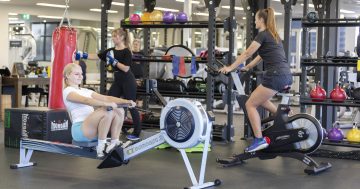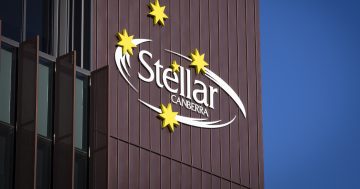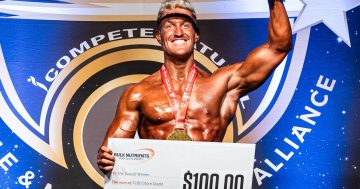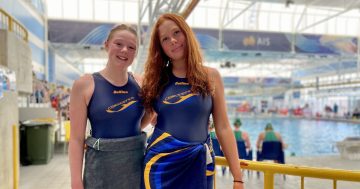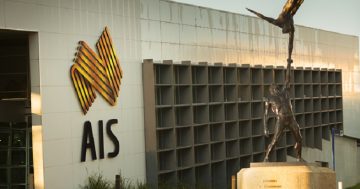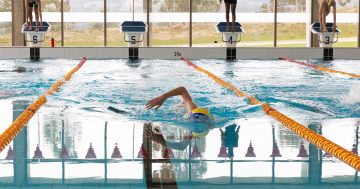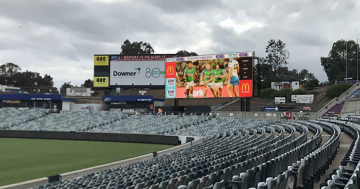
The AIS Fitness Centre houses three pools and a gym. Photo: Michelle Kroll.
News that one of the ACT’s largest fitness centres is pulling the plug on their aqua-aerobic classes has dealt a heavy blow to dozens of middle-aged and elderly Canberrans.
On Thursday, 9 September, members of the Fitness Centre at the Australian Institute of Sport (AIS) in Bruce received an email notifying them that it will not be reopening after lockdown lifts.
Operated by Sport Australia, the centre has been closed since the ACT went into lockdown in early August, but this was the first members had heard of a permanent closure. It has left them annoyed that they weren’t consulted and unsure of where to go next to keep fit and healthy.
The Fitness Centre incorporates 25 and 50-metre pools, a gym and a training pool. The closures will impact the gym, personal trainer sessions, recovery programs (dry and aqua), group fitness classes (dry and aqua) and school holiday programs.
The learn-to-swim classes and public swimming access will be business as usual once COVID-19 restrictions allow.
John Rees is one of many older members affected by the seemingly out-of-the-blue closure.
“There has been no consultation with any of the people who go to the centre, some of whom have been there for 20 years. All of a sudden, they get this email – on ‘R U OK’ Day, no less – saying that the Fitness Centres is closing. For a government agency, we think this approach by AIS has been appalling.”
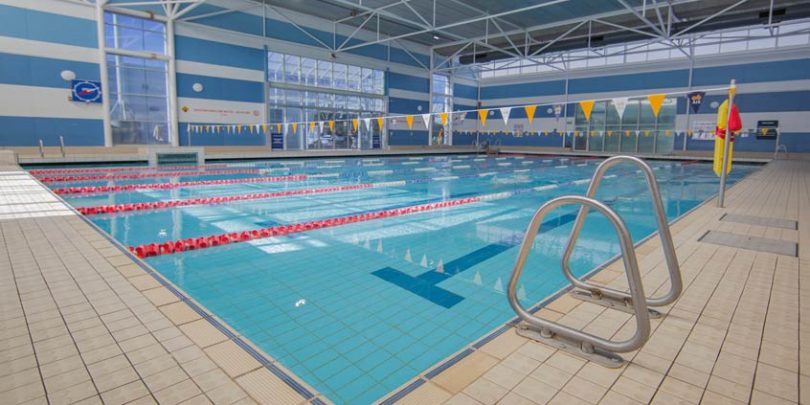
The 25-metre pool forms part of the AIS Fitness Centre. Photo: AIS.
John says they want someone to talk to rather than “close us down and put us out on the street”.
Seven classes were held weekly, with a minimum of 50 to 60 people attending each class. Combined with the gym, there are about 200 members on the books at the Fitness Centre.
Many of these people are unable to use treadmills and other forms of vigorous exercise and have turned to aqua aerobics for cardio and resistance exercises. The buoyancy of the water supports the body and reduces the risk of muscle and joint injury.
“There are no other places in Canberra providing the same level of support and, indeed, dedication to their clients as is provided by the Fitness Centre management team at the AIS,” John says.
The email from AIS sent out to members reads that the Fitness Centre and associated programs are “no longer commercially viable in what has become an increasingly competitive fitness sector”.
To assist members in finding other facilities, AIS also compiled a list of other fitness options available to members in their local areas and negotiated some discounts for these.
John and the other members are grateful for this effort but having looked into these options, but he says none are on par with AIS services.
Not only that, but the current COVID-19 restrictions in the ACT mean that none of them are open.
“We can’t even go anywhere for the next four weeks to consider what these other options are,” John says.
“I am concerned that if forced to go elsewhere, many will just opt out entirely and give up, to the detriment of their physical and mental health.”
He adds that for him and other members, it is about more than just keeping fit.
“Someone might say that it’s only water aerobics and who really cares, but here in the ACT, we have been focussed on the aging population for many years. And this is something that is quite devastating for many of them.
“It is not merely a place to focus on our physical health and fitness. It is where we go to meet up with friends and maintain our connection to the community.”
John says they have sought a meeting with Sport Australia so all issues can be put on the table with the aim of a good-faith review of the decision but have had no response to date.
A spokesman for Sport Australia says that members and holiday program participants are being contacted, and refunds will be provided for any fees paid and unused from the start of the ACT lockdown.
“Members are also being assisted to find alternate facilities nearby that can offer a similar service.”












